LETTER | Ignore the 'Green Wave', fear the 'Green Delusion'
LETTER | The "Green Wave" is not real. It is a popular, but ultimately inaccurate narrative to describe voting patterns in GE15. The reality is more complex, and we must debunk this myth.
What is real is the Green Delusion, where political leaders take the wrong lessons from GE15, and ultimately alienate allies and demotivate their own voter base.
The "Green Wave" is characterised as a wave of Islamisation, where young voters especially, have voted overwhelmingly for PAS to demand more religion-based laws and power given to Islamic bodies.
Some liberal-leaning voters blame the implementation of Undi18 for the "Green Wave".
As a reminder, an estimated 80 percent of young voters voted for the more liberal and progressive Pakatan Harapan in 2018.
If the "Green Wave" narrative were true, it would imply that tens of millions of young voters have undergone a radical conservative transformation in just five years. If this were the case, then PAS must possess the most exceptional public relations team in the world.
The data from GE15 reveals a different, more coherent story. Young voters did not overwhelmingly choose Perikatan Nasional. In fact, Pakatan Harapan-BN, GPS, and GRS collectively secured nearly 60 percent of the youth vote, especially among first-time Undi18 voters.
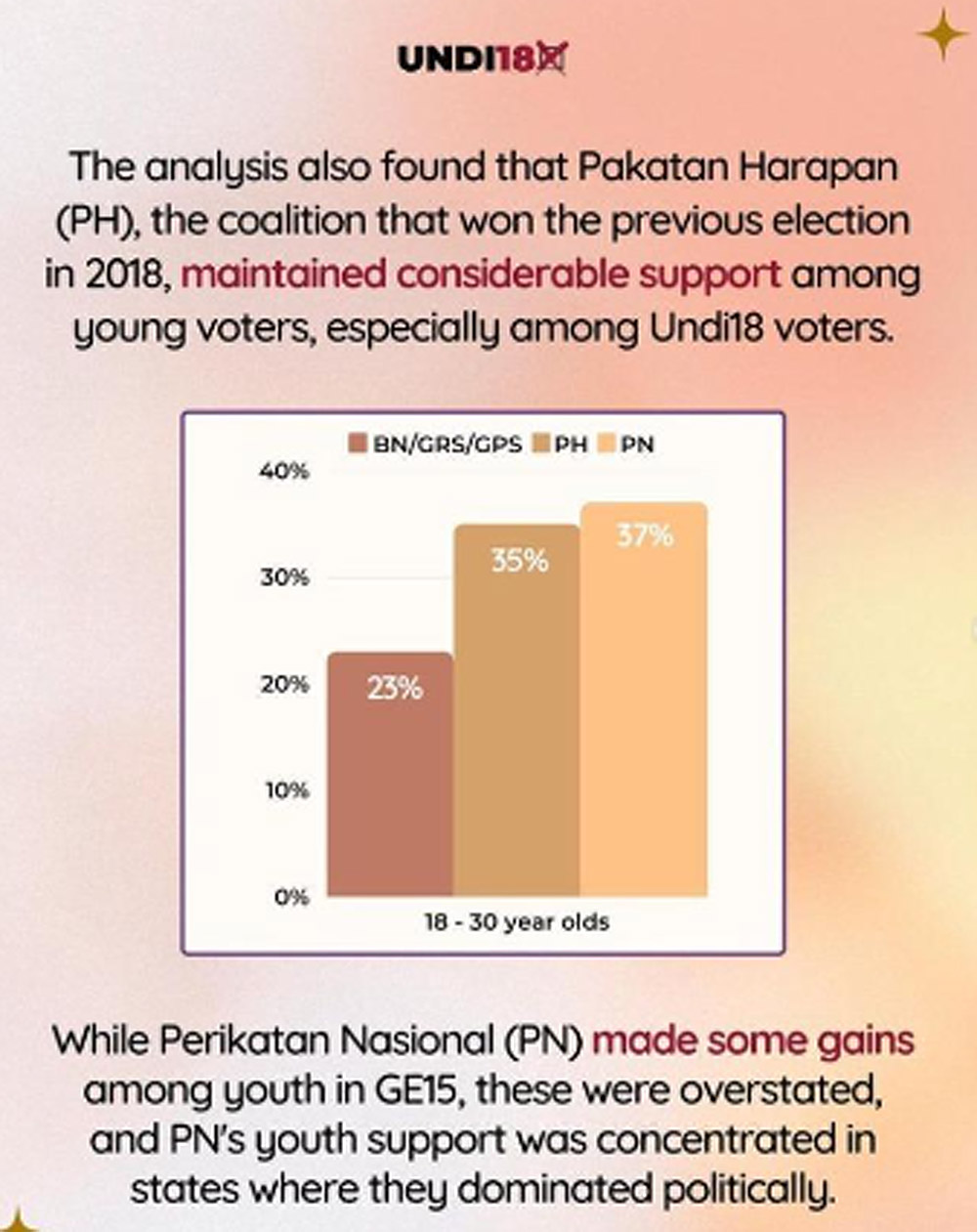
An Undi18 survey of youth sentiment in May 2022, showed that PN's popularity was weak, scoring last place among major coalitions. Top was Harapan-Muda at 22.4 percent, second was BN at 15.5 percent and third was PN at 13.8 percent.
Most importantly, the survey showed that up to 41 percent of youth were undecided. Therefore, the change in support within six months was not a deep ideological expansion; it was a battle to win the on-the-fence, less ideological voters. So how did PN do so well in such a short time?
In GE15, both Harapan and PN won an equal number of 71 seats out of the total 165 parliamentary seats in Peninsular Malaysia. PAS and Bersatu made huge inroads into Umno strongholds, with PAS becoming the single largest national party with 49 seats.
PN’s success can be attributed to its significant investments in social media. It engaged popular influencers and released coordinated videos to promote PN. As Abdul Hadi Awang’s son wrote in Harakah Daily: "PN's dominance on TikTok made a notable difference."
For those who do not use TikTok, it is a powerful platform because of how easy it makes video editing, video downloading and video sharing. This means thousands of pro-PN TikTok videos were being re-shared across Twitter, WhatsApp, Facebook, Telegram, and Instagram.
In contrast, Harapan and BN were late to the game. Harapan maintained dominance on Twitter, yet lacked major investment and coordination in TikTok. BN did not have a coherent digital strategy for GE15, with Najib Abdul Razak now in prison, denting his influence.
But what made PN’s social media strategy effective was its key message: the best choice for Malaysia without the integrity issues of BN nor the weaknesses of Harapan. The catchphrase PNBEST (Bersih dan Stabil) made that point clear.
Central to this narrative is the comparison of Muhyiddin Yassin (Tok Abah) versus Ahmad Zahid Hamidi. During GE15, Muhyiddin was portrayed as a religious, clean leader who would rather lose power, instead of releasing corrupt leaders. Handouts that were given out during the Covid-19 lockdowns were also attributed to Muhyiddin’s leadership.
Thus, this was reflected in a Merdeka Center pre-GE15 poll, with Muhyiddin being the most popular leader (71 percent support) while Zahid the most unpopular (12 percent support).
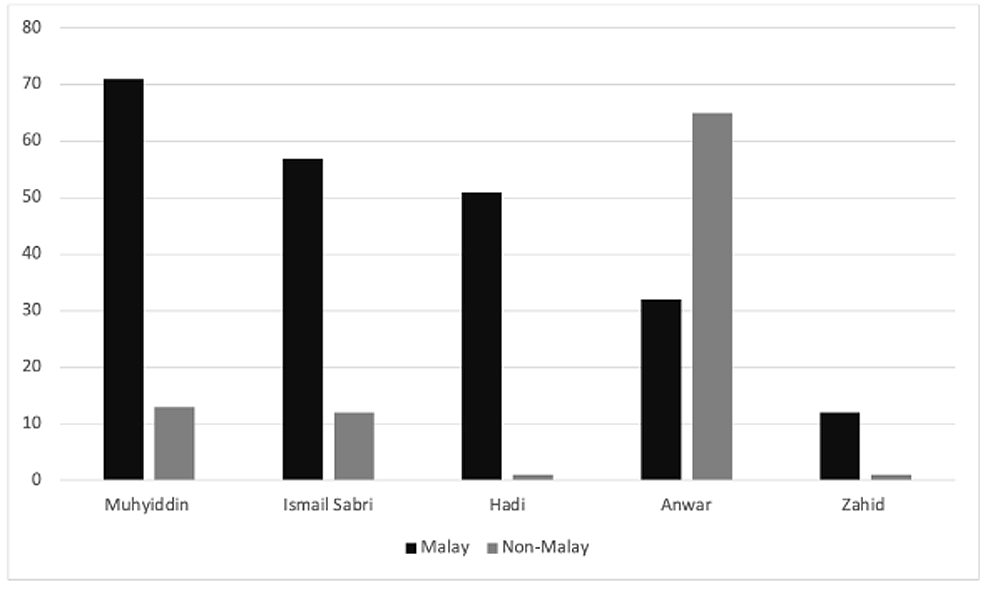
It is this electoral strategy that was pivotal in shifting votes among conservative-leaning Malay youth – from potential BN swing voters to PN voters in GE15. Other factors include the strength of PAS’ grassroots machinery and money politics during the campaign period.
Attributing PN’s electoral success to Islamisation is reductive and inaccurate. Most importantly, it is self-sabotaging.
What is the "Green Delusion"?
The "Green Delusion" is a belief that young Malay voters overwhelmingly want Islamisation and they will only vote for leaders who can prove their Islamic credentials.
According to the "Green Delusion", the only way to win Malay votes is to somehow beat PAS at its own game. This is part of the motivating factor why Prime Minister Anwar Ibrahim aggressively pushed to expand the role of the Department of Islamic Development Malaysia (Jakim) to be involved with economic affairs, digitalisation programmes and reviewing education curriculum.
The unity government has also given the greenlight to table the controversial Syariah Courts (Criminal Jurisdiction) Act 1965 or RUU355 (Act 355) in Parliament that was first mooted by PAS president Abdul Hadi Awang back in 2015.
But this belief is simply untrue. Voting for a party or a coalition does not mean that you subscribe entirely to its ideals and policy goals.
Many Harapan leaders and supporters made that mistake in 2018, assuming that young Malaysians were inherently liberal and progressive because the youth overwhelmingly voted for Harapan.
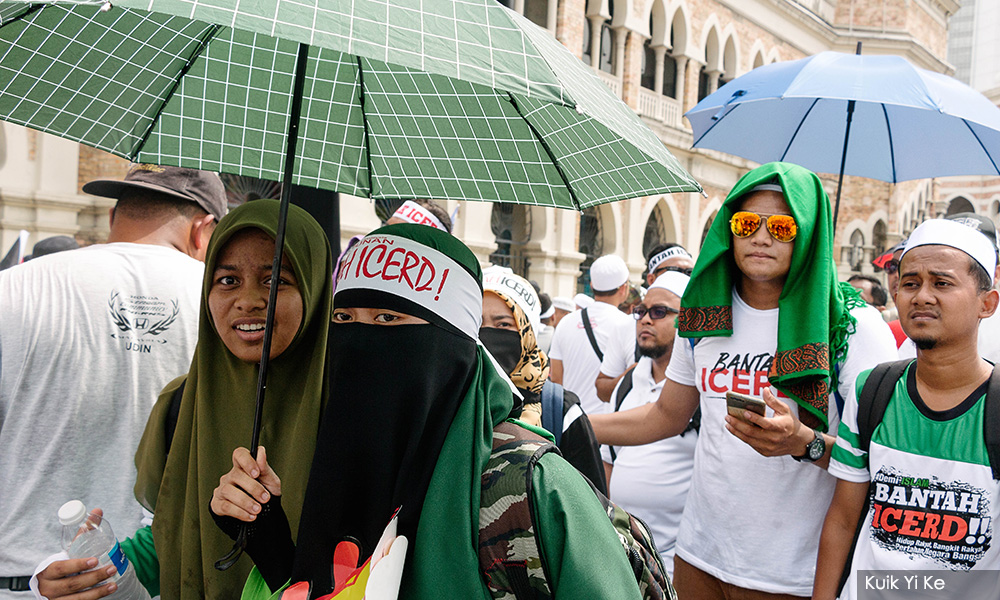
This belief hit the hard wall of reality during the 2018 rally against the Elimination of All Forms of Racial Discrimination (Icerd) – where thousands of young Malays, many of whom voted for Harapan just a few months before, came out to protest the new government.
Similarly, one cannot assume that the young Malays who voted for PN are simply diehard PAS supporters. Young Malays may simply be rejecting Umno and felt that PN was a better alternative with its anti-corruption messaging. Economic handouts provided during the Covid-19 lockdowns may have also appealed to some voters.
While ethnicity and religion shape electoral politics in Malaysia, “rice bowl” and economic issues remain the top priority for voters, across ethnic lines. This was proven in GE14, where unique offerings of abolishing the GST and gradually eliminating highway tolls, among other promises, were pivotal in getting swing Malay voters to shift to Harapan.
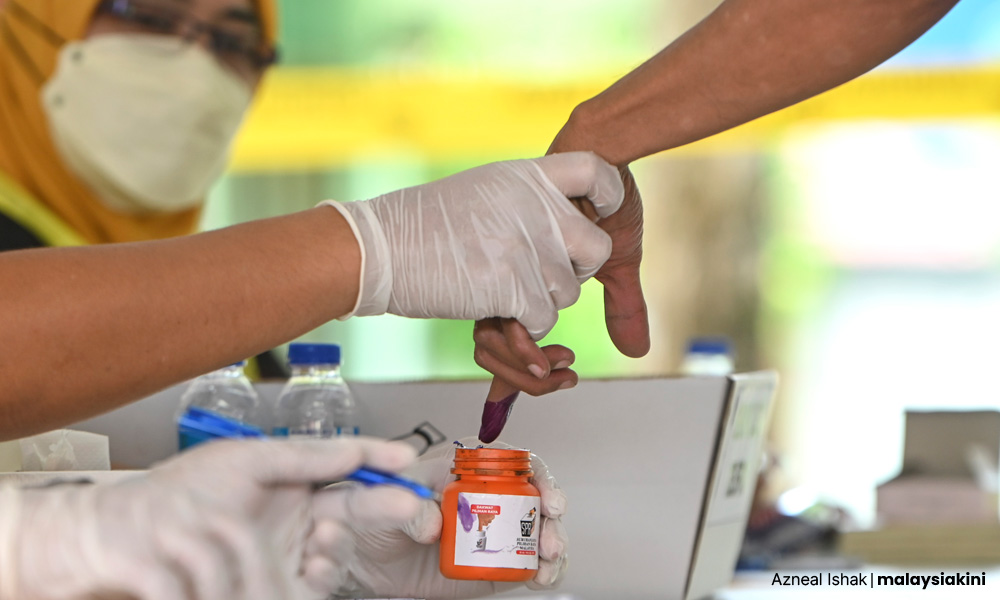
However, in GE15, voters found that economic platforms of political rivals were often aligned with similar promises. Should the unity government have the next five years in power, it must deliver a grand economic vision that can excite voters and differentiate itself from its political rivals – this is the key.
Also as important" is to communicate success stories consistently, and not just wait until election season.
The “Green Delusion” is often used as an excuse to mask the lack of investment and coordination in communications. For example, keyword analysis on TikTok reveals that the Jana Wibawa scandal was promoted hard in February and March 2023, yet the issue is underemphasised during the current election season.
How do you convince young Malay swing voters that PN is not “Bersih dan Stabil,” without consistent messaging?
As analysis by KiniNewsLab reveals, the unifying factor for young voters across ethnic lines is the rejection of BN and the preference for coalitions with strong anti-corruption messaging. Therefore, if you want to win the youth vote, perception of anti-corruption matters.
But the unity government has a challenge – Zahid. Renewing contracts for Attorney-General Idris Harun and MACC chief Azam Baki only make this challenge harder. Over the next few years, decisive action and legislation on transparency and anti-corruption must be done so that this government is seen as tough on corruption.
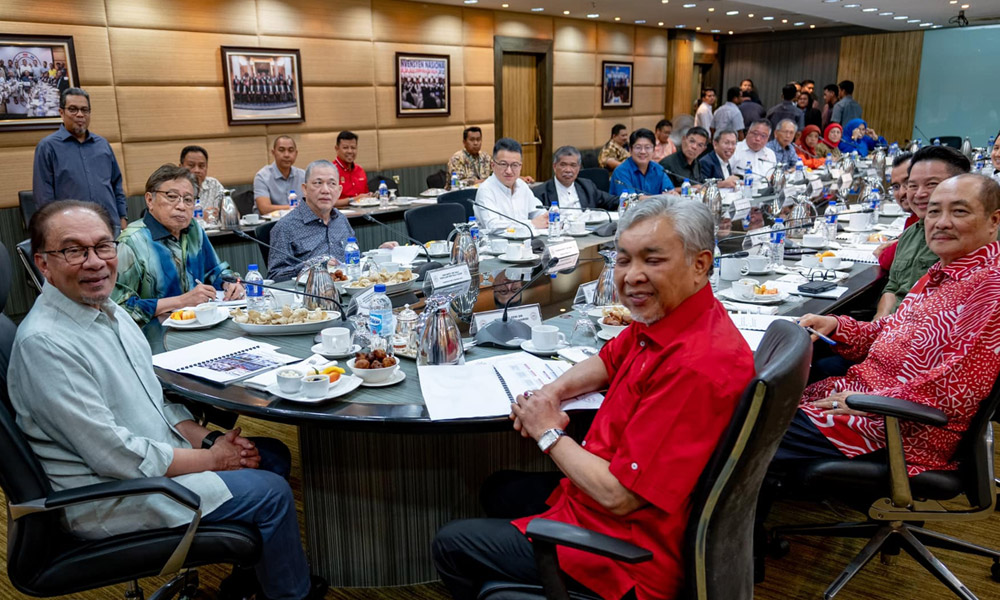
Finally, the unity government must accept that it cannot please everyone and it cannot win all voters – this is okay. Navigating the complex terrain of ethnic politics is difficult – it helps to have clarity on who is the “middle Malaysia” that this government should pander to.
The current “Green Delusion” strategy is to chase the ultraconservative Malay vote and outflank PN from the right. This risks angering or alienating its current base of supporters that helped bring Harapan into power. For example, there are already murmurs of discontent among the ethnic Indian community, with some feeling that the government is not addressing their concerns amid reduced ethnic Indian political representation.
Voters that feel unappreciated may opt to stay home or protest vote during the upcoming state elections.
Ultimately, the unity government must not self-sabotage by chasing the "Green Delusion". Janganlah yang dikejar tak dapat, yang dikendong berciciran (it’s better to hold onto something that you already have than risk losing it in pursuit of something better).
THARMA PILLAI is the co-founder and advocacy director of Undi18. He is a concerned young Malaysian and is not affiliated with any political party.
The views expressed here are those of the author/contributor and do not necessarily represent the views of Malaysiakini.
RM12.50 / month
- Unlimited access to award-winning journalism
- Comment and share your opinions on all our articles
- Gift interesting stories to your friends
- Tax deductable
